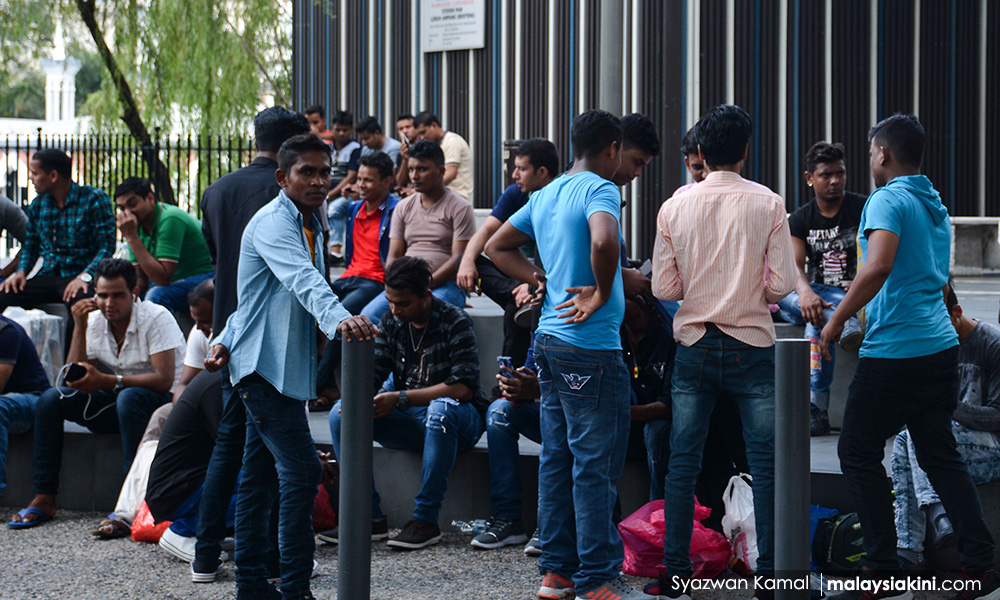In 1977, there was an exodus of senior journalists from the New Straits Times. A dozen or more moved to the then-fledgling The Star, which had moved its headquarters from Penang to Petaling Jaya.
The sub-editors’ desk was almost empty and reporters were moved to assist, but the newspapers needed experienced hands, especially since this was the time it was transitioning to computerisation.
It was then decided that they would recruit experienced sub-editors from India and Sri Lanka. Advertisements were placed in newspapers in these two countries and a few thousand applications were received.
Two editors flew to Colombo and then to Bombay for face-to-face interviews with the shortlisted candidates. A month later, two each from these countries arrived.
Work permits were applied for and obtained and after temporarily staying at the Station Hotel, they found accommodation in Bangsar, close to Balai Berita.
If this could have been done in the past, why can’t it be done now?

Supposing I am the owner of a farm and I need foreign workers. I will apply to the Human Resources Ministry for approval to recruit 50 workers.
I would then contact an agent in the host country, say Bangladesh, to ask him to identify the workers after which I would visit Dhaka and personally interview and select the workers based on their experience.
Of course, I would pay the local agent for his services and ensure that the workers do not pay any money to anyone and get indebted, after which, I would go to the Malaysian High Commission with the foreign workers' passports and apply for a landing visa - which would give me two weeks to arrange their work permits.
I would then accompany the workers to Kuala Lumpur to facilitate their clearance and subsequently send them for medical tests and other necessities, pay the levies, and get them their work permits.
In the process, I would save hundreds of thousands of ringgit by not having to pay a local agent who may or may not have the proper documents or may have obtained such documents by forging supporting documents.
Why is that employers are being compelled to go through local agents? Shouldn’t large plantation companies and the construction industry be allowed to recruit directly, eradicating the possibility of foreign workers being cheated and exploited by agents?
Similarly, why can’t I travel to Indonesia and get a maid using the same process? After deducting expenses, it would be certainly cheaper than paying RM17,000 to an agent.
‘Toll collectors’
This is because of a “toll collector” who must be paid. Those days, they were called touts who would help renew driving licences or re-sold cinema tickets for a small fee.
Subsequently, they became agents. Then, with development and big bucks, they became agents and later identified themselves as middlemen.
Not forgetting to mention, the New Economic Policy (NEP) created so many of them because, in some instances, government agencies were required to procure equipment from anointed persons.
Aware that the cost of such an arrangement would eventually be passed on to the government, it was nevertheless encouraged by the government.
From procuring everything - services and goods - for the government, a thriving multi-million-ringgit industry evolved.
From hospitals buying operation theatre systems to companies bidding for construction jobs, there’s always a middleman or agent involved who will get a cut for the services rendered.
Then came the rent-seekers who would facilitate services and goods to the government which are marked up for him to continually collect a percentage if the contract was in force.
‘Entrenched money-making system’
Judging by the evidence adduced in several proceedings in court, it is obvious that such a system is fully entrenched and millions change hands.
Those sitting in their plush offices enrich themselves and consider that their existence is part of the cost of doing business in the country.
To end this, there must be political will and determination. The authorities must be firm in dealing with manufacturers and providers of services and cut off middlemen.
But then, if it is done, several party supporters and those with connections in high places will be out of business. Will those in authority want to take such a risk? - Mkini
R NADESWARAN is a veteran journalist who writes on bread-and-butter issues. Comments: citizen.nades22@gmail.com.
The views expressed here are those of the author/contributor and do not necessarily represent the views of MMKtT.




No comments:
Post a Comment
Note: Only a member of this blog may post a comment.